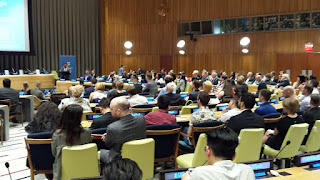Latin America: The usual forces, with surprising Results
Reposted January 30th, 2014
The Usual Forces, With Surprising Results

January 29, 2014
The expansion of L.G.B.T. rights in Latin America has followed a storyline that is similar to the expansion of civil rights more generally across the globe, but with some twists. The key forces include rising incomes, social movements, political parties and conservative actors. But in the politics of gay rights in Latin America, these forces have defied expectations.
Gay rights in Latin America have expanded the most in countries whose incomes are highest, namely Brazil, Argentina, Chile, Uruguay and Mexico. This much was predictable. Yet high income has been neither sufficient nor necessary. Not-so-rich Ecuador established same-sex civil unions constitutionally, whereas the very rich Venezuela and Trinidad and Tobago have dismal records on gay rights.
We know that when social movements are strong, widespread and committed to human rights for all, they help push for political rights. This too helps explain the legislative successes of those five high-income countries, home to some of the strongest social movements in the region.
However, social movements are also strong in Bolivia, Colombia, Costa Rica and Peru, and activists in these countries are having trouble expanding L.G.B.T. rights. What seems to make a difference, therefore, is not so much the strength of social movements, but rather, whether they forge strong ties with national-level political parties. In Chile, for instance, gay rights groups, despite their commitment to the left, worked closely with the center-right ruling party to promote the country’s first hate crime law.
It is not enough to look at the forces pushing for change. Barriers are also important, and in Latin America, as elsewhere, the most important barriers against L.G.B.T. rights are posed by religious groups. Where religious groups have strong ties to political parties, legislative progress for L.G.B.T. rights suffers. Sometimes it’s the Catholic Church that is closely tied to a party (e.g., Conservatives in Colombia); sometimes it’s the Protestant right (as in the United States and many English-speaking Caribbean countries); sometimes it’s both (as in Central America). Even in presumably revolutionary Cuba and Nicaragua, the ruling parties strengthened their ties with the Catholic Church hierarchy in the 2000s, and this is one reason they have lagged behind on L.G.B.T. rights. Civil rights in general often depend in upholding the separation of church and state, but in the politics of gay rights, the separation of church and party is just as vital.
Even within the five high-income countries, religious groups have strong ties with at least one party in Chile, Mexico and Brazil, which explains why L.G.B.T. legislation in these countries is less sweeping than in Argentina and Uruguay. In those two cases, the separation of church and party is the norm, and the type of Catholic practice is less fundamentalist; these nations’ Catholics attend church less often and are less opposed to same-sex marriage than Catholics elsewhere generally are.
Parties in Latin America could do more. They could encourage more politicians to come out, for instance. Even in the very pro-gay Argentina, openly gay politicians are rare, and this perpetuates a culture of complacency. Until parties transform themselves, they will only push for L.G.B.T. rights based on the allies they get. The more they align themselves with the progressive social movements, and less with religious groups, the more they can be counted on to bring about pro-gay change.
http://www.nytimes.com/roomfordebate/2014/01/29/why-is-latin-america-so-progressive-on-gay-rights/javier-corrales-noon-tues



Comments
Post a Comment